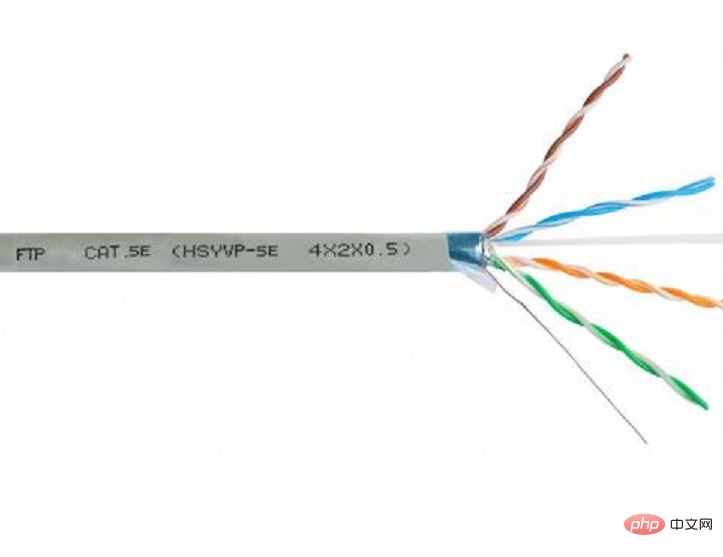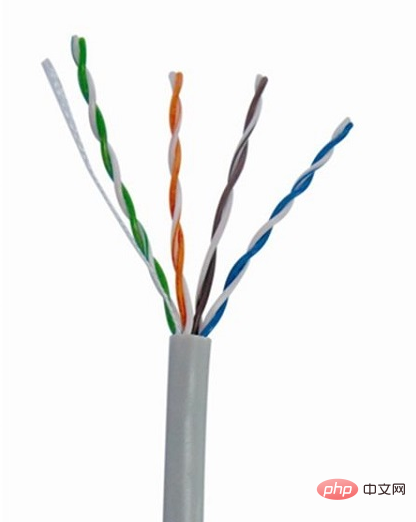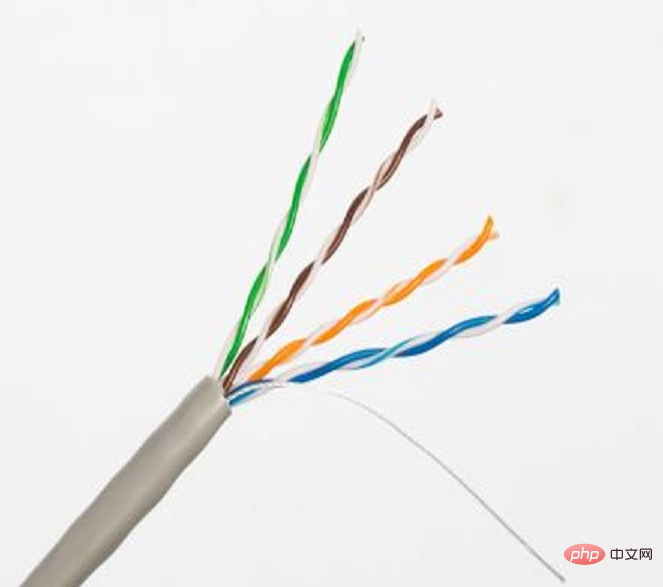What types of network cables are hsyv-5e?
hsyv-5e is a Category 5e network cable; hsyv represents the structure of the line, and 5e represents Category 5e. Its transmission frequency is up to 100MHz. It is a Gigabit network cable and can be used in Gigabit networks. , and the twisting degree of the central wire pair of hsyv-5e is relatively dense, the signal transmission is fast, the quality is better, and the durability is better.

The operating environment of this tutorial: Windows 7 system, Dell G3 computer.
hsyv-5e is a Category 5e network cable.
HSYV-5ESpecial cable refers to Category 5e untwisted pair (UTP—Unshielded Twisted Pair) and Category 5e twisted pair.
In hsyv-5e, hsyv represents the line structure, and 5e represents Category 5e. Its transmission frequency is as high as 100MHz. It is a Gigabit network cable and can be used in Gigabit networks, and hsyv -5e center wire pair has a denser twist, faster signal transmission, better quality, and better durability.

HSYV-5E special cable Computer LAN twisted pair can be divided into two categories: untwisted pair (UTP) and twisted pair (STP):
STP is wrapped by a layer of metal material to reduce radiation and prevent information from being intercepted. At the same time, it has a higher data transmission rate, but the price is higher and the installation is more complicated;
-
UTP has no metal materials and is only wrapped with a layer of insulating rubber. It is relatively cheap and has flexible networking. .
Except for some special occasions (such as severe electromagnetic nuclear radiation, high transmission quality requirements, etc.) where STP is used in wiring, we generally use UTP.
The UTP currently used can be divided into Category 3, Category 4, Category 5, Category 5e, Category 6, and Category 6e. Among them:
Type 3 UTP adapts to the requirements of Ethernet (10Mbps) for transmission media and is an important transmission medium in early networks;
4 Category UTP was launched later than Category 3 because the standard was introduced, and the transmission performance has not improved much compared with Category 3 UTP, so it is generally less used;
Category 5 UTP is expensive It is low-cost and high-quality and becomes the medium of Fast Ethernet (100Mbps);
Category 5e UTP is used for Gigabit Ethernet (1000Mbps).

The quality of HSYV-5E dedicated cable is one of the key factors that determine the bandwidth of the LAN. Some manufacturers wrap the wire pairs used in Category 3 or Category 4 UTP cables in Category 5 UTP cables. This method is difficult for ordinary users to identify. This so-called "Category 5 UTP" cannot achieve 100Mbps data transfer rates, it is 10Mbps or 16Mbps. A simple identification method is to use a twisted pair to connect two 100Mbps devices (network card to network card or network card to HUB), and use the monitor detection tool that comes with Windows 95/98 to monitor their data transmission rate during communication.

Extended knowledge:
Category 5e cable refers to Category 5e unshielded twisted pair (UTP —Unshielded Twisted Pair) and shielded twisted pair (STP—Shielded Twisted Pair), which are upgraded versions of Category 5 lines.
Category 5e unshielded twisted pair cable is a cable that appears after improving some of the performance of the existing Category 5 shielded twisted pair cable. Many performance parameters, such as near-end crosstalk, attenuation crosstalk ratio, return Wave loss, etc. have improved, but its transmission bandwidth is still 100MHz.
The logo of Category 5 line is "CAT5", with a bandwidth of 100M, and is suitable for networks below 100M; the logo of Category 5e cable is "CAT5E", with a bandwidth of 155M, which is a mainstream product; the logo of Category 6 line It is "CAT6" with a bandwidth of 250M. It is used to set up Gigabit network and is the future development trend.
The Category 5e twisted pair uses 4 winding pairs and 1 tensile wire. The colors of the wire pairs are exactly the same as the Category 5 twisted pair, which are white-orange, orange, white-green, blue, White blue, green, white brown and brown. The bare copper wire diameter is 0.51mm (wire gauge is 24AWG), the insulated wire diameter is 0.92mm, and the UTP cable diameter is 5mm.
Category 5e network cables are used in 100M networks. Category 5e has many specifications. Generally, oxygen-free copper network cables will be selected for important comprehensive wiring projects. Oxygen-free copper has small resistance and long transmission distance. Transmission is stable.
The difference between Category 5e indoor network cables and outdoor network cables is that outdoor network cables have double-layer wire sheaths. In order to adapt to the changing environment of outdoor wiring, the outer layer is a layer of PE black water-blocking skin, and there is a layer of PE black water-blocking skin inside. Layer PVC waterproof layer. The outer thread is thick, waterproof and sun-proof, tensile and compressive, wear-resistant and thick, effectively preventing internal water from entering.
The difference between Category 5e unshielded network cables and shielded network cables is that shielded network cables have a shielding layer that can resist external interference and maintain normal signal transmission.
For more related knowledge, please visit the FAQ column!
The above is the detailed content of What types of network cables are hsyv-5e?. For more information, please follow other related articles on the PHP Chinese website!

Hot AI Tools

Undresser.AI Undress
AI-powered app for creating realistic nude photos

AI Clothes Remover
Online AI tool for removing clothes from photos.

Undress AI Tool
Undress images for free

Clothoff.io
AI clothes remover

AI Hentai Generator
Generate AI Hentai for free.

Hot Article

Hot Tools

Notepad++7.3.1
Easy-to-use and free code editor

SublimeText3 Chinese version
Chinese version, very easy to use

Zend Studio 13.0.1
Powerful PHP integrated development environment

Dreamweaver CS6
Visual web development tools

SublimeText3 Mac version
God-level code editing software (SublimeText3)

Hot Topics
 1378
1378
 52
52
 What network cable to use for 2.5g network port?
Mar 20, 2023 pm 02:09 PM
What network cable to use for 2.5g network port?
Mar 20, 2023 pm 02:09 PM
The 2.5g network port uses Category 5e network cables and can be connected to Gigabit network cables. The 2.5G port is a network interface with a rate of 2.5Gbps. The actual rate is usually calculated as 2500Mbps; and the Category 5e network cable (cat 5e) can fully meet the transmission requirements of 2.5Gbps and 1000Mbps. Category 5e unshielded twisted pair is a cable that has improved some of the performance of Category 5 shielded twisted pair. Many performance parameters, such as near-end crosstalk, attenuation to crosstalk ratio, return loss, etc., have been improved. But its transmission bandwidth is still 100MHz.
 What types of network cables are hsyv-6?
Jul 12, 2022 pm 02:03 PM
What types of network cables are hsyv-6?
Jul 12, 2022 pm 02:03 PM
"hsyv-6" is Category 6 twisted pair (network cable); hsyv means twisted pair, and "6" means CAT6, which is Category 6. Category 6 network cable supports up to Gigabit network, which is 100M Category 5 An upgraded version of the network cable, the Category 6 twisted pair is somewhat different from the Category 5 or Category 5e twisted pair in appearance and structure. It not only adds an insulated cross frame, but also separates the four pairs of twisted pairs. in the four grooves of the cross frame, and the diameter of the cable is also thicker.
 Is the Category 6e cable marked 6e or 6a?
Oct 28, 2022 pm 02:06 PM
Is the Category 6e cable marked 6e or 6a?
Oct 28, 2022 pm 02:06 PM
The logo of Category 6e network cable is 6a, and its complete logo is CAT6A; CAT6E is an improved version of CAT6, but not CAT6A; Category 6e network cable and Category 6 network cable generally have a cross skeleton with insulating effect added to the internal structure, and will Arrange 4 pairs of twisted pairs in the 4 grooves of the cross frame respectively. However, the cross frame inside the Category 6e network cable generally uses a gear-shaped cable trough shape, while the cross frame of the Category 6 network cable is generally a straight line. Isolated.
 What types of network cables are hsyv-5e?
Mar 06, 2023 pm 03:10 PM
What types of network cables are hsyv-5e?
Mar 06, 2023 pm 03:10 PM
hsyv-5e is a Category 5e network cable; hsyv represents the structure of the line, and 5e represents Category 5e. Its transmission frequency is as high as 100MHz. It is a Gigabit network cable and can be used in Gigabit networks, and the hsyv-5e center line The twist of the pair is denser, the signal transmission is faster, the quality is better, and the durability is better.
 What should I do if the network cable is plugged in but the network cannot be recognized?
Jul 05, 2023 pm 03:47 PM
What should I do if the network cable is plugged in but the network cannot be recognized?
Jul 05, 2023 pm 03:47 PM
There are three solutions to the problem that the network cable is plugged in but the network cannot be recognized: 1. Unplug the network cable and restart the router; 2. Press Win+X, select Settings, click Network and Internet, select Ethernet and click Change Adapter Options, click After selecting Disable Local Connection, click again to select Enable; 3. Click Status in the Network and Internet interface, then select Network Reset in the pop-up interface, click Reset Now, and then the computer will restart within 5 minutes to complete the reset.
 What kind of network cable is hsyu5e?
Oct 21, 2022 am 09:31 AM
What kind of network cable is hsyu5e?
Oct 21, 2022 am 09:31 AM
hsyu5e is a Category 5e twisted pair, which has the characteristics of small attenuation and less crosstalk, and has higher attenuation to crosstalk ratio (ACR) and signal to noise ratio (signal to noise ratio), smaller delay difference, high performance greatly improved. The transmission frequency of hsyu5e is as high as 100MHz. It is a Gigabit network cable and can be used in Gigabit networks. The twisting degree of the wire pairs in hsyv5e is relatively dense, so the signal transmission is fast, the quality is better, and the durability is better.
 4pairs are several types of network cables
Nov 22, 2022 am 11:52 AM
4pairs are several types of network cables
Nov 22, 2022 am 11:52 AM
4pairs is Category 5 network cable. Category 5 cable is a twisted pair cable used in computer networks. It is also a multimedia cable used for data, voice and other information communication services. It is widely used in Ethernet and broadband access projects. Its quality is directly related to to the transmission quality of information communications.
 What is the line sequence of Class B network cables?
Mar 03, 2023 am 11:01 AM
What is the line sequence of Class B network cables?
Mar 03, 2023 am 11:01 AM
The line sequence of class b network cable refers to the line sequence of class b network cable. According to the standard wiring of T568B, 12345678 is orange and white, orange, green and white, blue, blue and white, green, brown and white, and brown. Both ends of the network cable follow this Prepare the crystal head in line sequence.



